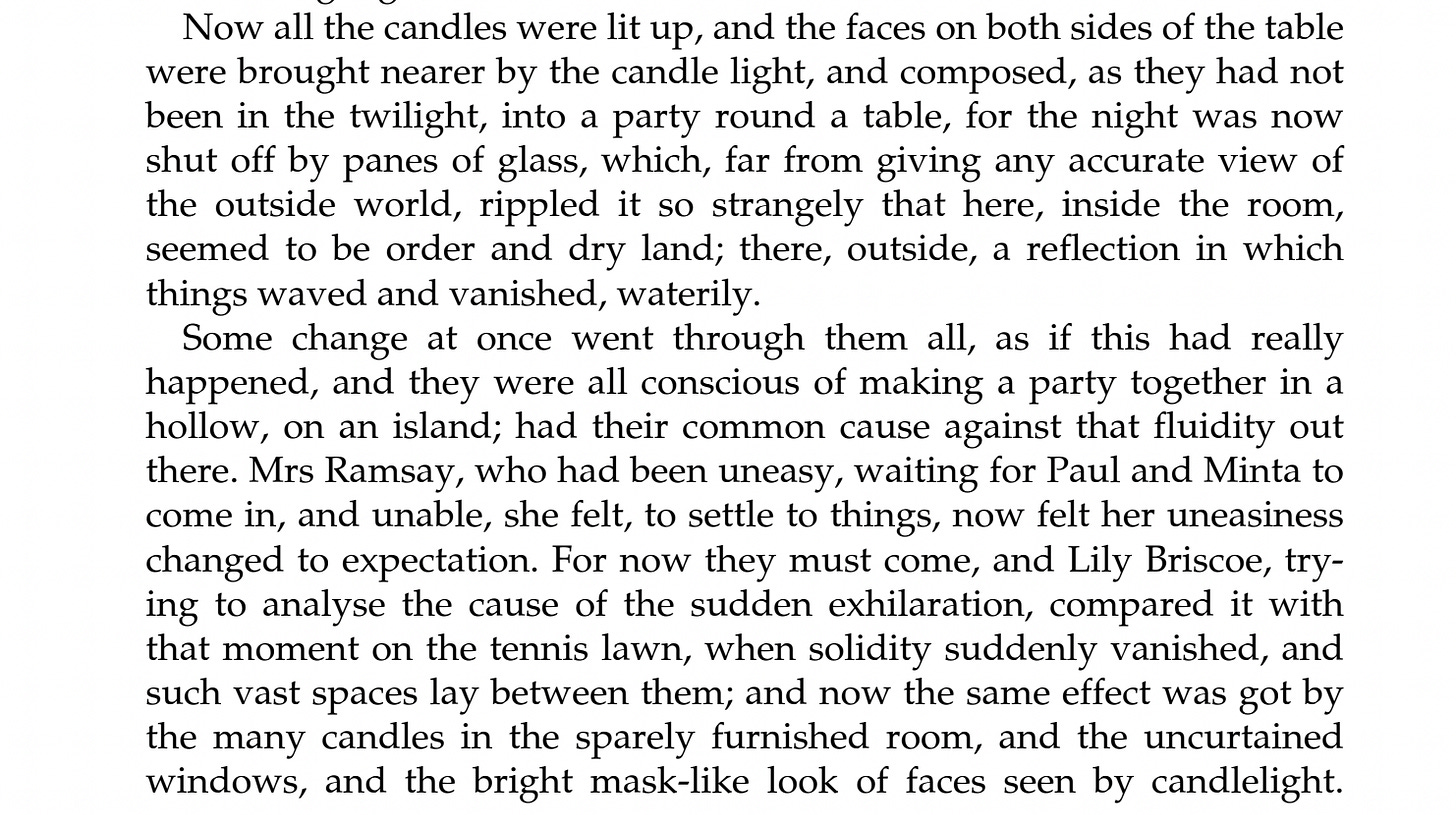Letter #39
Powers of observation
Hey —
You doing good? Y/Y? I’ve recently become enamored with this game, that surely I made up, of Just Saying Yes Because I’m Bored — no dwelling, no hemming and hawing, no evading or cancelling, just Yes, I’m going, because this midwinter night is crushing me babes. Geese played a show that made me believe in guitars and frontmen again (the rest of you openers need to work on editing). Soul Connection allowed for a euphoric exorcism; I saw myself outside of myself, fog-filtered violet light cascading over the planes of my face and every other bobbing face.
There’s a certain moment at any given public gathering, when the responsible amount of psilocybin interacts with the expensive amount of tequila, and I, feeling superior, scan the room intently, like I can hear the thoughts of everyone in the crowd. Intuiting the private details of their life based on the minutest murmur of the lips, the slightly awkward instep, the hand limply on the waist of another — it all breaks down before me in slow motion, and I am positive that it’s the powers of observation that will be my special skill to bring to the table in the event of the apocalypse.
I’ve got a habit of turning to my companions after this scan and remarking, “Everyone is just so broken inside.” A bad habit, I admit. For one, that’s obnoxious. And for two, so am I. And I’m here to tell you the last time I did that scan, it led to me tracking down an attractive crowd-person in a completely unflattering way, and they didn’t remember me at all. At all. Allegedly.
Some things you have to constantly re-learn in life. That everyone is not perceiving an interaction, a behavior, a moment in time, in the exact same way you are is one of them. That everyone at a bar at 2 a.m. is drunk, high, horny, and more than likely not your soulmate is another.
That said — everyone is just sooo, so irrevocably broken.
Including moi. I already said it. See: this new, brittle arc of paranoia. This updated ticker scrolling invisibly at the bottom of life’s unfurling scene: Ozempic-ozempic-ozempic-ozempic. It’s everywhere and it’s (clearly!) driving me fuckin nuts.
Me and every other fat kid who spent childhood thinking about The Day, the amazing Day, when we could finally be who we were supposed to be, our lithest selves, letting the walls of fat fall around us like a billowy dress and delicately stepping to its side, smugly revealing the real version that had been here all along— well goddamn, now it seems that if we have an extra $10k/year for the rest of our lives and a commitment to never enjoying food again, we could really, actually have The Day, after all.
I hated being a child because it was undignified. I hated being a fat child because it was humiliating. And I hate that I’m a grown woman reading breathtaking news like "six new galaxies in the early universe," or this horrifyingly ugly fact of something like Cop City, and the metronome at the back of my brain is still stuck on Be skinny. Be skinny. Be skinny. Ozempic.
Despite the satisfying way the rest of the Day plays out — the stadium of mean children and frowning adults meet our eyes to say, We accept you now! I never could look at you before without feeling disturbed— but you’re so pretty! — and we’re like, Nono, still fuck you, deuces, and float away from them, lighter and lighter — I don’t want it. I don’t. Because of what it means about them, and what it means about me. As we’ve established: the fantasy is always better than the reality.
And doesn’t it all come down to that — who you were when you were smacked with the realization that You Are Here, to stay, the soft part of your toes has connected to the ground, but your mind is on the blackened silhouette of trees so stark against the rapidly fading dusk, and why has that made you all of a sudden so, so sad?
: : : :: : : :: :: : : :: : : :: :: : :: : : : : : ::: : ::: :: ::: : : :: : ::: :: :: : : :: : : :: :: : :: : : : : : ::: : ::: :: : :
Billy Preston, “My Sweet Lord”
I was reading this Brian Eno profile and in it he mentions a Billy Preston performance he’s been transfixed by. This one autoplays after it and I’ve been listening to it daily ever since — his voice so clear, and guileless, and bright. That pure voice against the pervy, religious lyrics — I reeeeeally gotta see you, Lord, but it takes so long to rot for you, just wanna experience Paradise with you, my Sweet Freaky Lord — it’s like a ghost’s favorite hymn.
To the Lighthouse by Virginia Woolf (1927)
I never could manage to pick up a Virginia Woolf book and finish it (and like it) until this year. What led me to the lighthouse was actually a collection of striking photos of Julia Stephen, Pre-Raphaelite muse (she looks so familiar), mother of seven, including Virginia and Vanessa Bell, and the central figure of To The Lighthouse. Her beauty is one that implies wisdom, an her daughter wrote a painting dedicated to exploring its boundlessness and generosity.
What I’m trying to say is that the book’s construction, its concerns are that of a painting’s — an attempt to elucidate the connection between the vision and the execution; gestures of color that make up what the iris sees as people. The lens through which one individual sees another, sees the world, and how close one can get to inhabiting another’s bones. Subjectivity. Intuition. The kind of intelligence inscribed in a peerless face. The quality of light when life turns to memory right before your eyes.
Hm. How else to describe it in a way that tells you what it actually is. There is the Ramsey family, vacationing in their home on the Isle of Skye in the Hebrides. Mr. and Mrs. Ramsey and their seven children, the youngest of whom, James, would like to go to the lighthouse he can see from their window. Mrs. Ramsey thinks it reasonable, her husband, not. They have several meandering houseguests, of varying stations and strengths of ego, as you did in those days. Dinner is served.
As you read you can almost feel the warm cast of the candles under your chin.
Mr. & Mrs. Ramsey read together silently and aloud, their subconscious thoughts braiding together the threads of their dynamic. The second chapter, entitled Time Passes, is like an eye set on the cottage over ten years, its walls chipping and curtains billowing in an out as people die outside of its boundaries. Mrs. Ramsey, who has been the air that fills every corner, dies between brackets, [like this], and the Great War happens, and death is the constant churn. The remainder of the party returns to the home ten years later. We’re left with her unfinished portrait and an unchanged view of the lighthouse.
No touch, no loss, no hand, no sense
No wound, no waste, no lust, no fear
No mind, no greed, no suffering
No thought, no hurt, no hands to reach
No knife, no words, no lie, no cure
No need, no hate, no will, no speech
![Crate Digging 20220701 [Detroit Techno, House, Acid 80's & 90's Gems] - YouTube Crate Digging 20220701 [Detroit Techno, House, Acid 80's & 90's Gems] - YouTube](https://substackcdn.com/image/fetch/$s_!zqIE!,w_1456,c_limit,f_auto,q_auto:good,fl_progressive:steep/https%3A%2F%2Fsubstack-post-media.s3.amazonaws.com%2Fpublic%2Fimages%2F63878094-26d6-43ca-94d9-820d7323391d_1280x720.jpeg)
It’s cool to read about Detroit house DJ Al Ester. It’s better just to dance.
Sally Gunnar is the god of her own domain, and she likes it that way — or she has lived that way long enough to convince herself thus. In the book’s present, she is a middle aged woman with a dwindling amount of acquaintances and a toad in her back yard. In the past, the college student version of herself living in 1960s Portland, Sally, by all accounts, is a toad, hopping around glumly and compulsively, making mordant one-liners under her breath, and observing her peers from her vantage point of being kept at an arm’s length. Her friend Sam is a hairy, annoying guy living with five roommates who makes a habit of changing his name on a whim and incorporating Wittgenstein into casual conversation. He of course has a hot girlfriend, Carlotta, who in my mind looks like a cross between Cher and Shelley Duvall. Carlotta decides she wants to have Sam’s baby; the couple moves from the putrid city commune to a rancid country farmhouse. Their life is narrated by the specter of Sally, the toad, not egging them on but watching them fail. Between then and the present, Sally fails and fails herself, through a series of humiliating reproaches and incidents, and ultimately decides she is more at home in the world when removed from it.
What the story lacks in plot it makes up for in observation: the strong, assured voice of a character who only really has herself, through a combination of fear, design, and circumstance.
… I have discovered for the first time that there are people who actually dislike me. It has only recently come to my attention that there are a number of people who, given as full a knowledge of me as it's possible to get on a casual basis, find me insufferable, disgusting, irritating - even actively boring. It's a shocking realization, nearly incomprehensible. Even people I myself have liked or admired, and have made overtures toward. If it were envy or jealousy, I could understand completely. Those are my own prejudices, often enough. But the clues are obvious […] I can interpret a lifted eyebrow and a twisted mouth, or someone drifting away from my vicinity. Unappreciative dolts I am used to. […]
But that the shrewd, perceptive, and humorous might know me and turn away is something to think about. It is something to mull over in the bath and knead into the bread. So far my thinking on the subject allows two possibilities: Some of these people, by sheer form and inclination, are incapable of liking me. But some of these people must judge me by my own standards and find me wanting. Perhaps they think that laughing at the motivation for your own actions does not exculpate you from either motive or deed. I wonder sometimes myself.
Is this girl a bit o’me or what? Of all of us! Everyone is just so —
Something to knead into the bread —
Delighter



